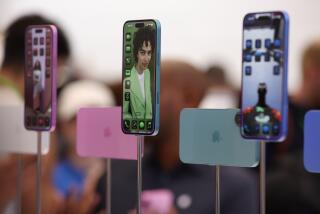The benefits and limitations of unlocked iPhones
Vivek Wadhwa recently used his iPhone while traveling in India.
“I only checked emails a few times, made several calls,” Wadhwa, a visiting scholar at UC Berkeley, recalled of the 12-day trip.
When he returned home, he received a shock: an AT&T phone bill with international roaming charges for $800.
“I was so outraged,” the Menlo Park, Calif., resident said. “So for the next trip, I hacked my iPhone — unlocked it — and just plugged in my local [Indian] SIM card.”
The charges for the Indian SIM, for voice and data, cost him as little as $2 per trip.
Now international travelers — and those who want to be able to use their iPhone domestically on T-Mobile’s cheaper but slower network — don’t have to tweak their devices. Apple Inc. is now selling unlocked iPhone 4s that are untethered to carrier contracts in the United States.
Although they are much more expensive than iPhones subsidized by AT&T or Verizon — a 16-gigabyte iPhone with a contract costs $199, whereas an unlocked version goes for $649 — the unlocked iPhones can save regular international travelers a lot of money. And they owners don’t have to play the cat-and-mouse game with Apple, which used software updates to negate unauthorized iPhone unlocks.
Officially unlocked iPhones work on what Apple called “the supported GSM wireless carrier of your choice” — referring to Global System for Mobile Communications, the network standard used by AT&T, T-Mobile, some regional carriers in the United States and many overseas.
“If you don’t want a multiyear service contract or if you prefer to use a local carrier when traveling abroad, the unlocked iPhone 4 is the best choice,” Apple says on its website.
However, because T-Mobile’s 3G frequencies are different from AT&T’s, users who want to run unlocked iPhones on T-Mobile’s network are limited to the slower Edge standard, on which the first iPhones released in 2007 operated.
Apple’s decision to sell unlocked iPhones could signal that it hopes to take another bite into rival Research In Motion Ltd.’s BlackBerry dominance in the business world. In its most recent quarterly earnings call with analysts, Apple said the iPhone was deployed or being tested by nearly 90% of Fortune 500 companies.
“If Apple decided to do this, you have to think there was a significant amount of requests that make it worth their while to do it,” said Tim Bajarin, president of Creative Strategies, who travels regularly to Asia. He spent $160 on AT&T voice and data roaming charges during a recent three-day trip to Taipei. “For international travelers, this is a real blessing.”
Richard Doherty with the Envisioneering Group called it “another hit and run against RIM,” which has lost market share in the United States as iPhone and Google Inc. Android devices continue to surge in popularity. “It’s a big step for Apple to be able to offer this to customers, both consumers and businesses.”
But buying an unlocked iPhone may be less appealing for some users if AT&T’s proposed $39-billion takeover of T-Mobile — now under review by government regulators — is approved, because it could eliminate the cost advantage of using T-Mobile’s network.
“The challenge will be what happens if the merger goes through,” said Parul Desai, policy counsel for Consumers Union, publisher of Consumer Reports, which opposes the merger. “We think it will increase prices for consumers. You’d have Verizon and AT&T controlling more than 80% of the market. Folks won’t have anywhere else to go if they want a low-cost competitor.”
When Wadhwa argued with AT&T about his $800 roaming bill, the company agreed to lower it to $300. Still, he became an instant fan of unlocked iPhones.
“It’s my phone and I should be able to use it wherever I want,” Wadhwa said. “Why should AT&T have a monopoly when I go abroad?”
While he’s a devoted Apple user, he won’t hesitate to switch to an Android phone if using an unlocked iPhone becomes too difficult in the future.
“They are a close second” to the iPhone, Wadhwa said. “There are so many options now. And they [Android phones] will work anywhere in the world.”
Boudreau writes for the San Jose Mercury News/McClatchy.
More to Read
Inside the business of entertainment
The Wide Shot brings you news, analysis and insights on everything from streaming wars to production — and what it all means for the future.
You may occasionally receive promotional content from the Los Angeles Times.










